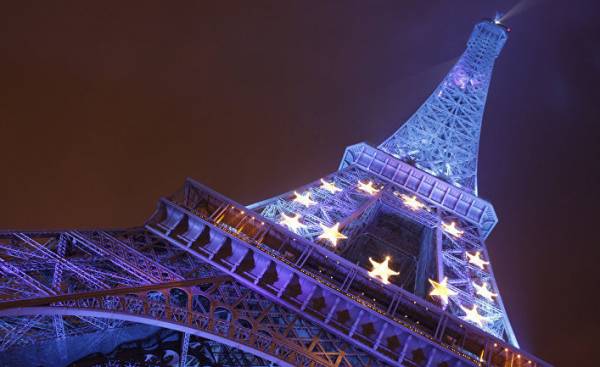
In the years of the Fifth Republic the centre-right and centre-left dominated French politics, gaining in the presidential elections from 44% to 76% of the vote. But the two failed presidency of Nicolas Sarkozy (2007-2012) and Francois Hollande (2012-2017) — destroyed the bipolar system. Studies show that the negative attitude of the French to Sarkozy eventually moved to disgust. As for Hollande, he quickly became the subject of ridicule and overt disdain. This has led to the present crisis of French democracy. According to CEVIPOF, 89% of French people think that “politicians care little for the problems of ordinary people.”
According to a survey conducted in December 2016 Institute of public opinion IPSOS for Le Monde newspaper, 57% of French people believed that democracy in France is bad, and 32% even suggested that there are other political systems that function no worse than democracy. In another survey of this Institute, 9% of the French say that the policy they are “indifferent” and 20% that they have for her “disgust”. They also found that 27% of respondents “in the past were interested in politics, but now it’s over, and now it does not interest them”.
In previous elections there was always a Central theme that dominated the campaign. In 1995 it was a “social divide”, which allowed Chirac ahead of Prime Minister Balladur. In 2002 was dominated by the theme of safety; in 2007, the problem of the work (“work More and earn more,” urged Sarkozy); in 2012 — crisis and the liability of financiers. This time in the campaign, there is no overarching theme. Although France has still not abolished the state of emergency, but the fight against terrorism does not hit the center of the debate. The problem of identity, which tried to impose marine Le Pen, did not become Central to the discussions of the candidates. “The emptiness of the campaign gave rise to the confusion of the French,” writes the French sociologist Olivier ray. According СЕVIPOF, 73% of respondents said that the election debates are primitive.
As a result, the voters themselves actually dictate the candidates of the axial theme of the election campaign — the crisis of political representation. Sociologist Bruce Ceinture writes: “None of the candidates managed to impose his theme, but voters imposed their — unblock the political system”. Resentment and anger have become important elements of the motivations of French voters. The famous French political scientist Roland Cayrol even published a book with a symbolic title “Causes of anger”. French sociologists speak of the possibility of such irrational phenomenon as dégagisme, that is protest for the sake of protest, without a clearly expressed desire to win power. This concept first appeared during the popular movement in Tunisia in 2011, when demonstrators raised the slogan “Dégage” (“Go”) against the President Ben Ali.
In 2010, Mélenchon has published the book “Qu’ils s’en aillent tous!” (“May they all leave!”), which became a bestseller. Indeed, during the electoral campaign within six months, the French threw overboard two French presidents, one current, and three Prime Ministers, one of whom has just led the government. At the same time they blew up two parties that ruled the country for 50 years. Now the candidates of these parties along and not gaining 30% of the votes, while in 2012, Sarkozy and Hollande were together 56%. The French political scientist Bruno KOTRA writes that these elections are reminiscent of the “Thriller, whose heroes are eliminated one by one.”
Bermuda square elections
Five days before the first round of ratings of the four leading candidates was so close that any projections become implausible, especially given the high level of absenteeism, a new political watersheds (especially of attitudes towards globalization and European construction, terrorism and immigration) and the weakening of the classic conflict between left and right. So the real chances to reach the second round of there are four of them: French sociologists think that in these elections, the threshold for reaching the second round will be reduced to 22%, and this result is quite achievable for the four candidates.
According to surveys of eleven institutions of public opinion, summarized the weekly Le Point, 18 April leader was macron, a former Minister of economy of the government of Hollande and the President of the centrist movement “forward!”, with 22.8% of votes, lost, really for two weeks, from April 3, nearly three points (25.5 per cent). The second was marine Le Pen, President of the far-right National front, with 22.2%, also lost in the two weeks to three percentage points (25.2 per cent).
They quickly catching up with Francois Fillon, candidate of the right of the Republican party, weakened by allegations of corruption (“Penelope gate”). In his April 18, 20,2%, and he won two weeks three percentage points (17.2 per cent).
But the biggest success was achieved Mélenchon, leader of the radical left movement “Unconquered France!”. According to the composite rating of the eleven national agencies, the results of Mélenchon and the candidate of the socialist party of Amun in mid-March, equal (on March 17, 12.4%), at the end of March Mélenchon was ahead of his rival in half (15% and 10%). In April, the Stripping of the electorate Amon continued: on April 18, his rating dropped to 7.9%, Mélenchon became the big four, gaining 18.8 per cent. Mélenchon is ahead by more than 10 points of Amun and almost catches up with Fillon.
A significant part of the French finds it difficult with his political choice, just not knowing how they should act. A lay to the last decision. Only two-thirds of the French said they were going to vote, while even in 2002, when he set a record for absenteeism in the presidential election, the proportion of abstentions was 28.4%. The Institute of public opinion BVA calculated that three weeks before the election, 38% of French people are not ready to go to the polls or unable to change its position, while in 2012 their share in the same period before the elections was 32%. And among the French, have already made the decision to vote, an unusually large proportion of persons, uncertain in its political choice. According ODOXA, 42% of those who are going to vote for Mélenchon, said that can change its position; 39% think the support of Amun, and 31% of those who chose Makron.
Speaking of undecided voters, French sociologists distinguish two types. The first — “voters strategists” who want to rationally calculate the vote for “their” candidate, weighing all the pros and cons. Them in the most peculiar principle of the “useful vote”: for example, who to vote for, not to prevent the victory of the National front. The second is voters who are bewildered in the new environment, get knocked down traditional political behavior. For example, the right voters for “Penelope-gate” thinking that it is better to abstain, to vote for the Macron, or even for marine Le Pen. However, on reflection it can support and former Prime Minister Fillon. When they offer to make a “second choice” in the absence of Fillon, only 6% are ready to vote for Madame Le Pen, and 58% would choose Him as a liberal and europeista.
However, the electorate of Macron makes the opposite choice, and 30% of its voters as the second candidate choose Mélenchon, which ideologically separates from the President of the movement “forward!” a huge distance. The electorate of Jean-Luc Mélenchon reciprocates: 40% of voters as the second candidate prefer Makron. It is primarily about antihistamnes voters both candidates: and those and others would like to punish the candidates of the establishment. At the same time, liberal alternative Fillon seduces only 12% of the electorate Makron.
Even more paradoxical choice do the voters of the National front of their most attractive Makron (33%) and Mélenchon (26%), despite the fact that statist and nationalist the program of marine Le Pen the opposite of the globalist and liberal theses of the Macron or the leftist ideas of Jean-Luc Mélenchon. Again, these voters integrates degaris aversion to system policies. Degaris can take different forms: anger and demands independence from France in Brussels, marine Le Pen, of social protest with Jean-Luc Mélenchon, and even of youth and optimism with Emmanuel Macron.
The CEVIPOF study, conducted in early April shows the relationship between the nuclear electorate and hesitating periphery. At the moment 43% of respondents have not decided for whom to vote, and at the same time 80% were interested in the presidential election. 56% chose their candidate, while 44% were going to vote as if involuntarily, “not having the best deals” (par défaut). We can say that first made an ideological choice, and the second is opportunistic. The ideological choice made by the majority of voters Fillon (68%) and opportunistic — the majority of voters Makron (57%). Madame Le Pen ratio in favor of ideological choice: 57% to 43%. Who made an opportunistic choice (most often on the principle of utility voting) less confident in their choice, and 61% of them may change their choice (among those who made the ideological choice of only 24%).
It turns out that 17% of voters are in frustrirovannosti, for their decision is forced and they doubt him. The most ideological and the final choice do the voters of Fillon and the National front (respectively 56% and 51%). In the electorate of Macron is dominated by swing voters (only a third accepted the ideological and the final decision). And swing voters Makron torn by contradictory feelings: 20% I don’t vote for Amon; 20% for Mélenchon; 19% for Fillon, and finally, 24% — just refrain. Thus, the electorate of the Makron is the most fragile.
The chances of Jean-Luc Mélenchon for second round
The rise of the leader of the movement “Unconquered France!” began after the first TV debate on 20 March, in which he showed himself as a brilliant political scrapper, and after a large rally on 18 March in Paris, which, according to organizers, was attended by about 130 thousand people. In a televised debate, the audience was impressed of Jean-Luc Mélenchon as a real policy with his program as “an honest man”, according to the French sociologist Bruno Ganbara.
An important element of his image, according to focus groups conducted by sociologists of the Institute of public opinion ВVА, was the feeling of his proximity to the people, so important in the period of acute crisis of confidence in the political elite. “It is more affordable than other candidates. Felt his desire to be closer to the people”, — said serving 48 years with the North of France. “This is an intelligent man, educated, with a sense of empathy towards other people, especially the disadvantaged,” said the owner of 54 years. 19% of voters said that it was his personality, not his program, encouraged them to support Mélenchon.
Furthermore, Mélenchon, despite the fact that he’s in politics for more than twenty years, is perceived as a new candidate, his programme envisages reform of the institutions of the Fifth Republic, including extension of the political rights of citizens. “I think that only the program “Unconquered France!” can return to the French the right to Express their opinion, which must exist in a democratic regime”, — said the employee of 32 years, left in their beliefs.
As a result, the candidate of the socialists Amon began to lose the confidence of their constituents, who began to side with the charismatic Jean-Luc Mélenchon. The leadership of the socialist party increasingly began to ask myself the question, “will the Amon to gain 5% of votes to be eligible for reimbursement of election expenses”. In addition, the low result of the presidential election will hurt the party in the parliamentary. The socialist party is becoming increasingly fragile organization that can fall apart at any moment.
Left or, more precisely, leftist voters found a candidate who can reach the second round, and in accordance with the principle of the “useful vote” has shown increasing willingness to support it. Left-wing voters are increasingly saying that Amon needs to withdraw his candidacy in favor of Mélenchon.
Thus, the candidate “Unconquered France!” have used “reproduction of a display of enthusiasm”: the more it was talked about as a candidate that rises, the higher he climbed; the higher he climbed, the more it was talked about and so on. According IFOP, 44% of French people say that “best expresses left-wing values” Mélenchon, 31% — Amon, and 21% — macron.
Focus groups show that the candidacy of Mélenchon restores the conflict between left and right. Left-wing voters are still not conclusively decided in his political choice. For someone to vote to prevent a second round between Le Pen and Fillon? Who has more chances to pass the second round? For whom to vote, without abandoning its self? More than half of the voters Amon can change your choice; a significant part of the electorate of the Makron has not made a final decision. And in the electorate of Jean-Luc Mélenchon about a third of the not fully defined. “The difficulty of choosing between the mind and the heart leads left to the migraines”, they have been dogged by controversy, they feel “lost” and “trapped in a corner”.
From the point of view of Ganbaru, the limit will come at a time when Mélenchon will cease to be treated as “perovskom bubble” and begin to seriously analyze his ideas. His policy proposals for the EU, international relations or even in the socio-economic sphere are at odds with the preferences of the majority of the French, who wanted less taxes, less government, more flexibility and freedoms for businesses. And the cost of it projects exceeds any reasonable limits and is estimated at 270 billion euros.
And it is unlikely the French will inspire images of Fidel Castro and Hugo Chavez, the favorite characters of Jean-Luc Mélenchon, or the fate of modern Venezuela, with its galloping inflation. Here is what an employee 70 years of the programme of Jean-Luc Mélenchon: “Who can believe that he will be a good President? His program is laughable, because it cannot be implemented”. Retired 68 years believes his program is “complete nonsense”. Macron and Fillon in almost the same tones criticize the draft Mélenchon, calling it “absolutely irrational” and “worthy of the French Communist party in 1960”.
Since 1981, the radical left in France did not receive more than 14% of the votes and to overcome the threshold of 20% for them is quite difficult. Even to penetrate the “popular strata” Mélenchon is not very easy, because of his soft position on immigration discourages those workers and employees who were already seduced by the national front. Experts ВVА write that on the basis of left-wing values Mélenchon has secured a sufficiently broad social base, but there remains the problem of its expansion. The left is split, and competition Rules and Amun, most likely, will not allow him to reach the second round.
On the other hand, sprint Mélenchon hit the positions of the Macron, which the French and the majority of commentators regarded as the winner of the first round and, therefore, as the next President of France. To it flowed voters disappointed in their traditional candidates: Fillon for “Penelope-gate” or Amon because of his falling rating and leftist statements. Due to the growth of the rating of Mélenchon between him and the Macron there was competition for the left-wing voters: vote for one of them is preferable to stop the national front? In this sense, Mélenchon has highlighted the weakness of the centrism of the Macron. Bruno Sanbar emphasizes: “Jean-Luc Mélenchon has revealed the weakness and volatility of the electorate Makron. For those who vote for the left, Emmanuel macron remains too soft a choice that can only be done due to the lack of other options. And this is logical, because he is the candidate of the center, the electorate is always the most fragile.”
The situation of Macron is much better than the other candidates. According to OpinionWay Les Echos on April 18, macron not only ahead of marine Le Pen by one point (23% and 22%), but easily outperforms it in the second round with a score of 64% to 36%. In addition, 47% of respondents believe that he is a future winner of the presidential election (the other three are called 12-16%). His winning wish 25%, the success of the rest of only 16-17%.
Break if Fillon “Penelope gate”
Despite the constant exposing the stuffing, the rating of the Fillon does not fall below 18-19%. It is a nuclear electorate “the right of France, which will vote for the conservative candidate, despite the wind, rain or snow, with a linen clothespin on the nose”.
According to the weekly L’express, Fillon “has shown that the ability to resist, that none of the right-wing politicians didn’t know.” He managed to suppress all attempts to nominate another candidate from the Republican party, maintained the party’s unity and even in some measure received the support of their main rivals Juppe and Sarkozy. However, according to the newspaper Le Parisien, the former President of France has Fillon only formal support at the same time refusing to participate in joint activities. The newspaper quoted him as saying: “However, as it is inflated. He dragged us into this shit, and that’s you. Shot in the head and it also demands responsibility from us. What a nerve!”
However, Fillon had to face several intractable problems. First, the degradation of the image, which was honest and impeccable political behavior. Now in the “honest politicians” it takes only the sixth place that actually last. Only 23% of French, according to a recent survey ELABE, treat him positively and 49% — “very negative”. The sociologist Yves-Marie Caen, emphasizes: “His image for a long time undermined previous work. He kept his nuclear electorate but the extension is very bad.”
The fall in the rating of Fillon caused primarily by disappointment centrist voters who focused on the moral approach in politics and more than a third of which was immediately stopped to give him a positive evaluation, while the electorate, “Republicans” turned out to be more sustainable.
Another serious problem was the Catholic electorate who largely brought him victory in the primaries. To “spy-gate” Fillon received up to a third of the votes of the Catholics and almost half of the votes of practicing Catholics. Fillon practically lost the support of their non-Christian voters (January and February, their share declined from 12% to 10.5%), tangible is the loss of Catholics not attending mass (from 27% to 21%), but among practitioners, the situation became catastrophic: Fillon lost among them 12 points (from 49% to 37%). If the majority of the French are characterized by a highly cynical approach: “not without sin”, “all steal”, the devout parishioners peculiar moral approach, and it is more difficult to forgive small sins Fillon.
For the former Prime Minister, the electorate is particularly important: he is older and more likely to vote than the average French voter. And he keeps sending them signals: promises to rewrite the law Tobira to close the possibility of full adoption for homosexual couples, to prohibit medical conception for lesbian couples, to establish a uniform in high school and to encourage the development of private schools. On the issue of abortion, he occupies a dual position: that with regard to the “personal faith” he “does not approve of abortions”, but it is not going to prohibit them, and to change the law in this area. Moreover, Fillon does not preclude appointment to a Ministerial post of the representative of the Association Sens commun, a spokesman of political interests integral Catholics, closely connected with the Republican party and ever-supportive former Prime Minister during the election campaign.
In the last weeks of the campaign Fillon was to take a right position in accordance with the classical principle: “In the first round you have to gather the electorate, the second — to fight for its extension”. He recalled that impose strict quotas for immigrants, promises to defend women against radical Islam. The Republicans declared Him “the mouthpiece of communitarianism, which was the enemy of France.”
The Fillon still has reserves about 20% of voters Sarkozy 2012, according to polls, have not yet made their choice, and the candidate “sovereign right” Nicolas DuPont-Aignan, gaining about 4% of the vote. According to sociologists, Fillon easier to nip off his voice than to win them from the Macron or Le Pen.
It is possible that the Catholics, or Republicans, in the heat of the Fillon after “spy-gate” will return to him, seduced by his economic program, his approach to public issues, his political experience, the ability of the Republican party to form a parliamentary majority and most importantly the inability to find an alternative. But this process is very painful. Many will vote for him “holding his nose” or don’t even dare to admit it. François-Xavier Mott, 27 years old, from Paris, and consultant on governance, in January renounced Fillon, and even thought to vote for Mélenchon honest, but after rational reflection realized that cast a ballot for the former Prime Minister, “burning with shame” and “pain in the heart.” Sylvain Lemer, a thirty-year resident of Lille, after January reviewed all the options: to break up the newsletter with the last name Fillon, choose Le Pen or Macron, but in the end admits: “I think that will vote for him.” Process, sales Director, first listened of Him and came to the conclusion that the former Minister “is able to speak without saying anything” and therefore returned to Fillon, forgetting about all the “doing”.
Again Fillon believes that in the last two weeks, as in the primaries, he will reverse the trend. It’s not just that the leaders of the race lost a couple of rating points, and Fillon managed to chew off one or one and a half percent. First, it poured so much dirt that it is hardly new revelations will change something. And although its image cannot be radically improved, occurs naturally fatigue from the stream of defamation. As said the French scientist Luc Ruben, “an individual’s ability to withstand criticism and revelations creates the credibility of the policy.” “I was tempered in the tests,” said Fillon at the last meeting.
Second, the Fillon launched a counterattack, accusing Hollande in creating the “black Cabinet” that intercepts all the flow of information and transmitting to the media and to the Prosecutor the compromising evidence on the competitors. Instead of a small corrupt appears a different picture — the victim of an unpopular government.
Thirdly, the moral factor has for the voters of far less importance than political authority of Fillon, his competence, professional skills. The French do not show much respect for politicians: Fillon is considered “fair” only 8% of respondents; marine Le Pen — 12%; Emmanuel Makron — 16% (however, the left-wing candidates have a little more respect: Mélenchon called “honest” in 21%; Amun — 23%). But Fillon ahead of all in its ability to govern the state: 27% ready to recognize his ability to carry out presidential functions; 22% — for the Makron; 20% for marine Le Pen, and only 13% for Amon or Mélenchon. According to an Ipsos survey for Le Monde and the CEVIPOF conducted in early April, to 70% right-wing voters competence policy is more important than his “honesty” (for 17% — on the contrary).
The importance of competence and political authority increases in connection with the aggravation of the international situation after the US strike on Syria, “with the emergence of the black clouds of war”, as said by the former Prime Minister. According to Fillon, “the world has become a much more dangerous and unstable than it was a decade ago.”
Public relations service of the Fillon hit on the weakest points of the main competitor. The macron is called a backup Hollande or “Emmanuel Hollande”, especially after the accession to the candidate of the movement “forward!” former Prime Minister Manuel Valls, which Republicans consider as the “kiss of death”. Fillon is trying to promote not so much himself, as the party relying on all its factions and clans. At the rally on April 9 at the Port de Versailles have gathered all the leaders of the Republican party. Makron first put forward 14 candidates in the parliamentary elections, publishing a list consisting of little-known civic activists, and Fillon suggested France 250 notables rooted in their districts.
All commentators agree that the rating Fillon is not very high for the right candidate, but given the unusual nature of these elections, “atypical” campaign, we can expect any surprises. However, experts in political sociology do not believe in the existence of a “hidden vote” and assume that among undecided voters Fillon can earn a maximum of 2.5 points, which is insufficient to exit the second round.
Whether to keep marine Le Pen’s leadership
Of course, Madame Le Pen still retains its leading position: with virtually equal with Macron the rankings of the electorate more sustainable. However, there are signs that her campaign is beginning to fizzle out. Revelations of corruption schemes related to payment of her security guards and other individuals for fictitious work as assistants to the MEPs, of course, led to this effect as “Penelope gate”, but still work as a “slowly-acting poison”.
Le Pen has ceased to be the only anti-system politician has risen sharply Mélenchon, and Makron uses antiestablishment rhetoric. According to the IFOP survey, 29% of voters said that they support the national front, primarily to Express their dissatisfaction with the other political parties. Now they have the opportunity to move on to Mélenchon, and, as we have seen, they do not rule out a vote for the Macron.
Deepening contradictions between the two lines of the National front between the Republicans, the nationalists, led by Florian Filippo, the current alter ego of marine Le Pen and the national Catholic headed niece Marion maréchal Le Pen. Filippo has adopted a number of ideas of Charles de Gaulle, and even laid flowers on the grave of the General, that can not annoy many supporters of the National front: Vichy, people from the French of Algeria, participants antipolitical resistance, that is all, for whom the idol remains of Jean-Marie Le Pen.
From the Gaullist Arsenal were drawn to the idea of popular referendum, the primacy of people over intermediate institutions and political parties, protection of the project “Europe of fatherlands”, extended from the Atlantic to the Urals, economic dirigisme, and the principle of secularism. In addition, the national front, you might say, monopolized the ideology of the “welfare state”, “state of the cartridge”, which is gradually giving the socialists. On the contrary, the artisans, small entrepreneurs, public sector managers are dissatisfied with the statism of the National front, Catholic secular bet on France. For Marechal Le Pen religion is the main enzyme of French and European ideology. For her, the clash between Islam and Christian civilization is the main conflict of our time. This is its main difference from her aunt and grandfather, who in General are indifferent to religion.
At the debates, Le Pen attacked on many fronts: it affected the “fairness” attitudes in the social sphere, the problem of European construction, its relation to the secular state. We can say that she probably lost the debate. But the main condition of its success was the high level of absenteeism. With the increase in turnout declines and the result of the National front. While it is impossible to determine the proportion of abstentions in the first round. If it is as high as in 2002, or even above, the Le Pen guaranteed exit in the second round. If the turnout falls only to the level of 2007, Madame Le Pen may have problems. According to the CEVIPOF at the beginning of April, interest in the presidential elections is very high: they are interested in 79% of the respondents readiness to vote was small, but gradually increases and reaches comparable levels to previous elections.
Interesting the problem of the second round. Overall rating French sociologists: “the Victory of Le Pen is incredible, but it cannot be totally excluded”. However, Serge Galam, mathematician and fellow of the Center for political studies At Sens, predicted the victory of trump, despite all the polls that suggest an easy victory of the Macron over Le Pen (with a score of 63% to 37%) and relatively steady success Fillon (56% to 44%), said that lately he began to think that her victory is quite likely, despite the existence of a “glass ceiling”. From his point of view, the stated intention of political behavior does not always match the actual vote. 56% of respondents say that they will vote against marine Le Pen. But some of them (about one third) may refrain because of the extremely negative attitude to its opponent: the left — right Fillon, right-wing to centrist to Him and especially to the leftist Jean-Luc Mélenchon (true to the Macron this applies to a lesser extent). As a result of differential absenteeism Madame Le Pen may on the eyebrows to win the election.
For the parliamentary elections
In the conditions of bifurcation of the political system of France and the high volatility of electoral behaviour any political arguments about the likely finalists should be thoroughly checked. All of the surveys, for example, show that the Makron comes out in the second round, but a study of five mathematics students from the Paris school of Telecom, based on big data, surveys, political geography, social network analysis, expects that after April 23, formed another Duo: Madame Le Pen from 24.13% and Fillon with 21,77%. According to them, the macron will be the third (of 20.32%), and Mélenchon fourth (18,66%). Of course, the accuracy of these findings is striking and even a little alarming.
It’s even harder to talk about the parliamentary elections. One thing is clear: absenteeism in France will increase dramatically and will hit the most by the losing political forces. The party of the winner usually gets an extra 5-7% of the vote, and it gives you the ability to recreate the vertical power.







